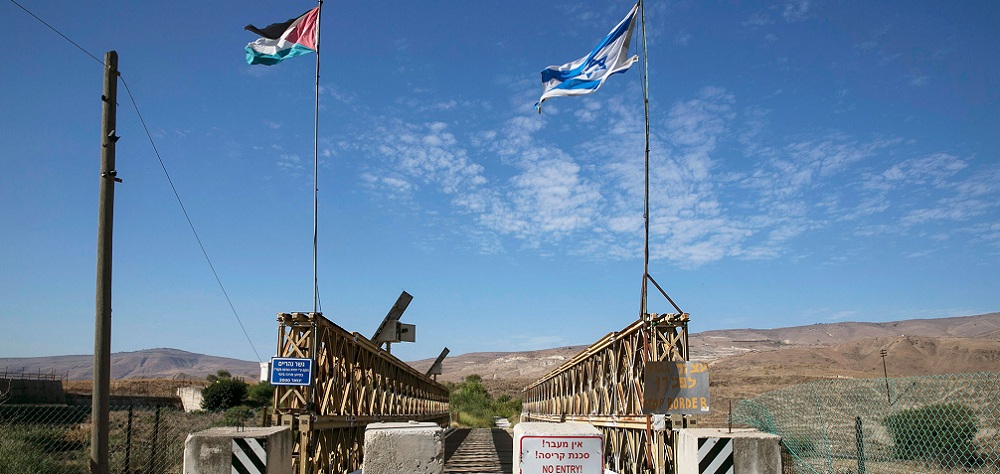Alwaght- As the Israeli-Jordanian treaty on renting out the two Jordanian regions of Al-Baqura and Al-Ghamr to Tel Aviv is expiring after 25 years, the occupying regime has begun efforts to renew the 1994 agreement.
According to the Israeli Haaretz newspaper, Idan Greenbaum, the head of the council of Jordan Valley, which contains the two tracts of lands, has recently sent a letter to Jordan’s King Abdullah II asking him for a meeting to find a settlement. After two weeks, the Israeli paper reported, he has not received any response to the letter from Amman.
Greenbaum said that the negotiations with Jordan have gone nowhere so far, adding that upon the treaty expiration, the Israeli farmers and tourists will be banned from the two Jordanian regions.
According to the length set in the Wadi Araba treaty between the Israeli regime and Jordan in 1994, the 25 years of the lease will end on October 26. Under the terms of the treaty, the special arrangement was to remain in force for 25 years and could be renewed automatically or terminated with one year’s notice by either party.
Jordan made it clear last year to the Israelis that it will not renew the agreement and that they should be returned to it. King Abdulla II in a statement last year said: “Jordan has decided to end the terms of the treaty that allow the Israelis to use Al-Baqura and Al-Ghamr regions and this decision was passed to the Israeli side. Al-Baqura and Al-Ghamr are Jordanian lands and they will remain Jordanian. We will apply our full sovereignty on our territories.”
As the government stated the intention to take back the two regions, the former head of Jordan Bar Association Saleh al-Armouti said that on November 10 the two regions’ sovereignty should be handed back to Jordan. “This is the date in which the agreement was implemented and published at the time’s publications,” he was quoted as saying.
Why is Jordan unhappy with Wadi Araba accord?
Al-Baqura is a border area east of Jordan River in Irbid province which is located north of the Arab country. Al-Ghamr is also a border region in Aqaba province south of the Dead Sea. It is known as a disputed region between the Israeli regime and Jordan. The two regions were occupied during the Arab-Israeli wars by the Israeli forces in the second half of the 20th century. The Israeli forces occupied Al-Baqura in 1950. Al-Ghamr was seized by them in 1967. A few months after the Gaza-Jericho agreement with the Israelis, Jordan signed the Wadi Araba peace agreement, established diplomatic ties with the Israeli regime, and rented out the two regions for 25 years to the Israelis. During all these years, Tel Aviv gave the lands to Jewish farmers.
The main issue that has pushed Amman to revoke the agreement is the style of distribution of the water of the Jordan River between Jordan and the Israeli regime. The water distribution was the topic of talks between Amman and Tel Aviv. It took them several decades to sign Wadi Araba and Oslo, both proving full detrimental to the Arabs in terms of sharing the water sources.
Under the terms of the deal, Tel Aviv gained the right to control the water sources in Wadi Araba and Yarmouk regions. According to the deal, the Israelis were committed to transferring annually 55 million square meters of water to Jordan. But over the past 25 years, they only transferred 35 million square meters to the Arab monarchy.
One-sided benefits of the treaty to the Israeli regime and the troubles the Jordanian government faces as results of this agreement— including the home discontent and the Israeli violation of the terms of a deal that allows Jordan to be custodian of the Muslim holy sites including Al-Aqsa Mosque— motivate Jordan leaders to announce, since a couple of years ago, the intention not to renew what it sees humiliating and colonial treaty.
Itzhak Levanon, a former Israeli ambassador to Egypt and a researcher at Herzliya Institute, in an effort to find a solution to the issue recently suggested to the Israeli leaders that Tel Aviv should expand joint projects in science and energy with Jordan, offer conditions to Jordan for use of Haifa port while Jordan’s border crossings with Syria are closed, and boost ties with Amman along with Washington.
On the other side, Jordan knows well that the return of the two regions can bring it huge benefits, particularly in the agriculture sector. But the Jordanians are extremely worried about the Israeli intention to annex the Jordan Valley to other occupied territories. Tel Aviv practically revealed its occupational nature when it unilaterally revoked the agreements with Palestinians, pushed for US embassy relocation to al-Quds (Jerusalem), annexed Syria’s occupied Golan Heights, and built settlements in the West Bank. In late September the Israeli Prime Minister Benjamin Netanyahu in a speech broadcast live by the Israeli channels said "Today, I announce my intention, after the establishment of a new government, to apply Israeli sovereignty to the Jordan Valley and the northern Dead Sea.”
On December 10, four days after Trump’s recognition of al-Quds as the Israeli capital, Jordan parliament’s lawmakers voted to “review” the treaties with Tel Aviv. Despite Amman’s show of resolve to take back its territory, with the Israeli history of disrespect to the international law and agreements on the strength of supported offered to it by the US and the West, Jordan will very likely take its case to the international organizations to condemn the Israeli seizure of its lands. Such a possibility gives an outlook of deteriorated Israel-Jordanian relations.



























